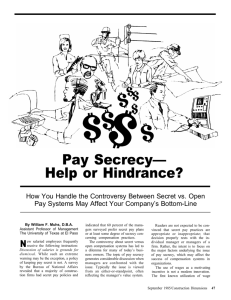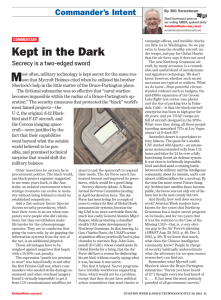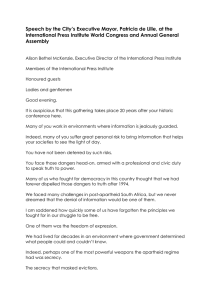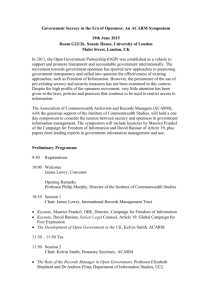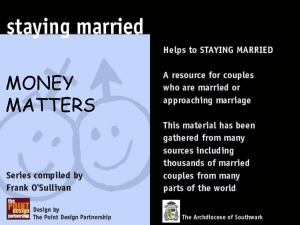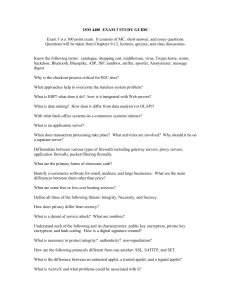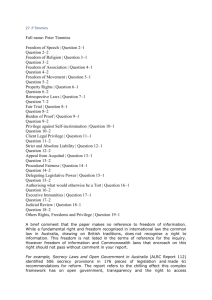What Motivates You
advertisement
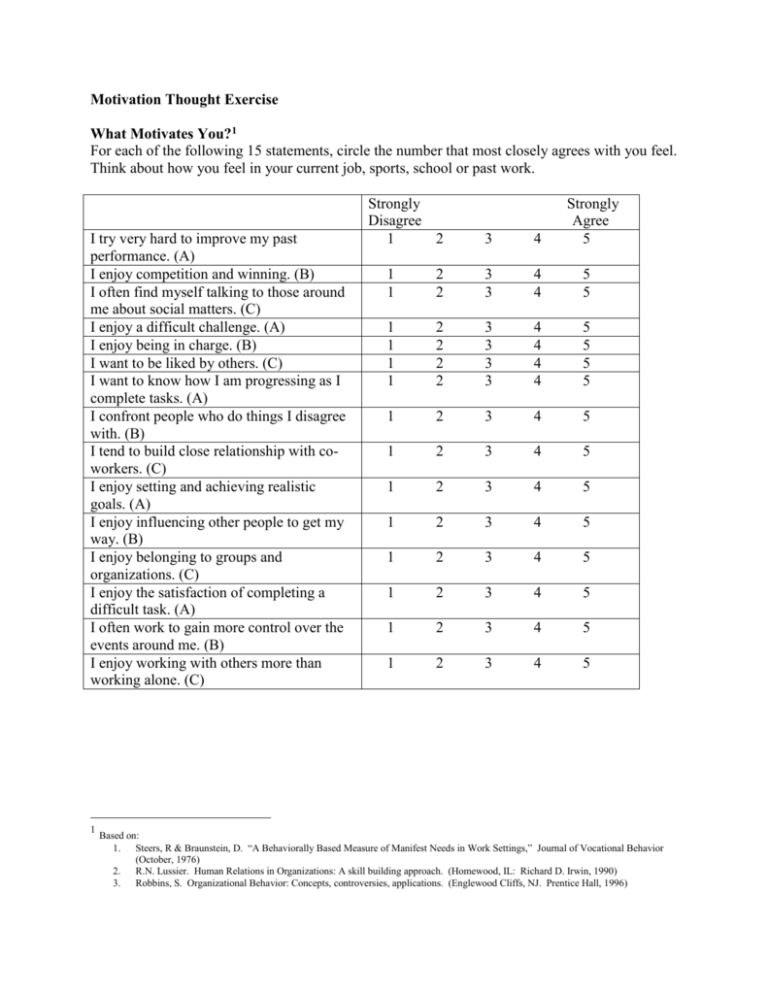
Motivation Thought Exercise What Motivates You?1 For each of the following 15 statements, circle the number that most closely agrees with you feel. Think about how you feel in your current job, sports, school or past work. I try very hard to improve my past performance. (A) I enjoy competition and winning. (B) I often find myself talking to those around me about social matters. (C) I enjoy a difficult challenge. (A) I enjoy being in charge. (B) I want to be liked by others. (C) I want to know how I am progressing as I complete tasks. (A) I confront people who do things I disagree with. (B) I tend to build close relationship with coworkers. (C) I enjoy setting and achieving realistic goals. (A) I enjoy influencing other people to get my way. (B) I enjoy belonging to groups and organizations. (C) I enjoy the satisfaction of completing a difficult task. (A) I often work to gain more control over the events around me. (B) I enjoy working with others more than working alone. (C) 1 Strongly Disagree 1 2 3 4 Strongly Agree 5 1 1 2 2 3 3 4 4 5 5 1 1 1 1 2 2 2 2 3 3 3 3 4 4 4 4 5 5 5 5 1 2 3 4 5 1 2 3 4 5 1 2 3 4 5 1 2 3 4 5 1 2 3 4 5 1 2 3 4 5 1 2 3 4 5 1 2 3 4 5 Based on: 1. Steers, R & Braunstein, D. “A Behaviorally Based Measure of Manifest Needs in Work Settings,” Journal of Vocational Behavior (October, 1976) 2. R.N. Lussier. Human Relations in Organizations: A skill building approach. (Homewood, IL: Richard D. Irwin, 1990) 3. Robbins, S. Organizational Behavior: Concepts, controversies, applications. (Englewood Cliffs, NJ. Prentice Hall, 1996) How Equity Sensitive Are You?2 The following questions ask you what you’d like your relationship to be with any organization for which you might work. For each question, divide 10 points between the two answers (A and B) by giving the most points to the answer that is most like you and the fewest points to the answer that is least like you. You can, if you like, give the same number of points to both answers. And you can use zeros if you’d like. Just be sure to use all 10 points on each question. Place your points in the blank next to each letter. In any organization where I might work: 1. It would be more important for me to: _____ A. Get from the organization. _____ B. Give to the organization. 2. It would be more important for me to: _____ A. Help others. _____ B. Watch out for my own good. 3. I would be more concerned about: _____ A. What I receive from the organization. _____ B. What I contribute to the organization. 4. The hard work I would do should: _____ A. Benefit the organization. _____ B. Benefit me. 5. My personal philosophy in dealing with the organization would be: _____ A. If you don’t look out for yourself, nobody else will. _____ B. It is better to give than to receive. 2 Robbins, S. Organizational Behavior: Concepts, controversies, applications. (Englewood Cliffs, NJ. Prentice Hall, 1996) Point and Counterpoint: Should Pay be Public? 3 Point: The Case for Pay Secrecy “Oh, and one last point,” said the director of HR to the new hire. “We treat salary information as a private matter around here. What you make is your business and no one else’s. We consider it grounds for termination if you ell anyone what you make.” This policy of pay secrecy is the norm in most organizations, although in the majority of cases, it’s communicated informally. The message trickles down and new employees quickly learn from their boss and peers not to inquire about what other people make or to openly volunteer their own salary. However, in some companies, pay secrecy is formal policy. For instance, at GM’s Electronic Data Systems (EDS) Corp. unit, new hires sign a form acknowledging several policies, one of which states the employees are allowed to disclose their salaries, but if such disclosure leads to disruption, they can be fired. It doesn’t take a genius to predict this policy effectively stifles discussion about pay at EDS For those raised in democratic societies, it may be tempting to surmise something inherently wrong with pay secrecy. On the other hand, if it’s wrong, why do the vast majority of successful corporations in democracies follow the practice? There are a number of logical reasons why organizations practice pay secrecy and why they are likely to continue to do so. First, pay is privileged information to both the organization and the individual employee. Organizations hold many things privileged – manufacturing processes, product formulas, new product research, marketing strategies – and US courts have generally supported the argument they pay rightly belongs in this category. Salary information has been held to be confidential and the property of management. Employees who release such data can be discharged for willful misconduct. However, most employees want to keep their pay secret. They are as comfortable discussing their specific pay as they are providing details of their sex life to strangers. Employees have a right to privacy, and this includes ensuring their pay is kept secret. Second, pay secrecy lessens the opportunity for comparisons among employees and the exposure of perceived inequities. No pay system will ever be perceived fair by everyone. One person’s “merit” is another person’s “favoritism.” Knowledge of what other employees are making only highlights perceived inequities and causes disruptions. Third, pay differences are often perfectly justified, yet only for subtle, complicated, or difficult to explain reasons. For instance, people doing similar jobs were hired under different market conditions. Or two managers have similar titles, although one supervises 10 people while the other supervises 20. Or one person earns more today than a coworker because of responsibilities held or contributions made to the organization in a different job several years earlier. Fourth, pay secrecy saves embarrassing underpaid and underperforming employees. By definition, half of an organization’s work force is going to be below average. What kind of organization would be so cold and insensitive as to publicly expose those in the lower half of the distribution? Finally, pay secrecy gives managers more freedom in administering pay because every pay differential doesn’t have to be explained. A policy of openness encourages managers to minimize differences and allocate pay more evenly. Since employee performance in an organization tends to follow a normal distribution, only through pay secrecy can managers feel 3 Robbins, S. Organizational Behavior: Concepts, controversies, applications. (Englewood Cliffs, NJ. Prentice Hall, 1996) comfortable in giving large rewards to high performers and little or no rewards to low performers. Counter Point: Let’s Make Pay Information Open to All!! Open pay policies make good sense. They already exist for employees of most public institutions and for top executives in all publicly held corporations. A few private sector companies have also seen the benefits that can accrue from making the pay of all employees public knowledge. For instance, the computer maker NeXT Inc. has lists of all its employee’s salaries hanging in company offices for anyone to consult. Why do open pay policies make good sense? We can articulate at least five reasons. First, such pay policies open communication and build trust. As an executive at NeXT stated, “Anything less than openness doesn’t establish the same level of trust.” If the organization can be open about such a sensitive issue as pay, it makes employees believe management can be trusted about other concerns that are not so sensitive. In addition, if an organization’s pay system is fair and equitable, employees report greater satisfaction with pay and with pay differentials where pay is open. Second, an employee’s right to privacy needs to be balanced against his or her right to know. Laws to protect an employee’s right to know have become more popular in recent ears, especially in the area of hazardous working conditions. The case can be made that the right to a free flow of information includes the right to know what other in one’s organization earn. Third, pay secrecy is often supported by organizations not to prevent embarrassment of employees, but to prevent embarrassment of management. Pay openness threatens exposing system inequities caused by a poorly developed and administered pay system. An open pay system not only says to employees that management believes its pay policies are fair, but itself as a mechanism for increasing fairness. When true inequities creep into an open pay system, they are much more likely to be quickly identified and than corrected when they occur in pay secrecy systems. Employees will provide the checks and balances on management. Fourth, what management calls “freedom” in administering pay is really a euphemism for a “control.” Pay secrecy allows management to substitute favoritism for performance criteria in pay allocation. To the degree we believe organizations should reward good performance rather than good political skills, open pay policies take power and control away from managers. When pay levels and changes are public knowledge, organizational politics is less likely to surface. Finally, and maybe most importantly, pay secrecy obscures the connection between pay and performance. Both equity and expectancy theories emphasize the desirability of linking rewards to performance. To maximize motivation, employees should know ho the organization defines and measures performance, and the rewards attached to differing levels of performance. Unfortunately, when pay information is kept secret, employees make inaccurate perceptions. Even more unfortunately, those inaccuracies tend to work against increasing motivation. Specifically, research has found that people overestimate the pay of their peers and their subordinates and underestimate the pay of their superiors. So where pay is kept secret, actual differences tend to be discounted, which reduces the motivational benefits of linking pay to performance. Discussion of Open Pay Articles: 1. Before class- to get you thinking! a. Would you like to work for a company with open or secret pay policies? In which type of organization would you perform better? b. Would this differ depending on whether you were a top, average or bottom performer? c. If you found out that someone you worked with, at the same level of the organization, with was paid more than you were how would you feel? Would it make a difference if that information was public from the beginning? 2. During class: a. As we discuss the different theories of motivation, consider (and be prepared to discuss) which system, open or secret pay, would be supported by a given theory or which individuals would be best motivated by which system according to that theory. b. Be prepared to think about your answers to these first questions as they relate to the results of your self assessment? What Motivates You? Sum up your answers to A, B and C A = ____ B = ____ C = ____ How Equity Sensitive Are You? Sum the points you allocate to the following items. 1B = _________ 2A = _________ 3B = _________ 4A = _________ 5B = _________ Total = ________


